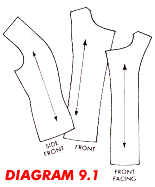
THE WAR OF JENKINS' EAR
Geoffrey Babbitt
The War of Jenkins' Ear is a relatively obscure piece of history. And yet its name is strange enough to make an enduring impression. Peculiarity alone, however, has proved insufficient to boost the war into popular awareness. Two reasons can explain this. First, the actual, historical war is less interesting than its title, which refers more to the preceding events than the war itself. Second, the war has only marginal historical significance. Jenkins' Ear merges into the War of the Austrian Succession and is overshadowed by greater events in the same century: the French Revolution, the reign of Catherine the Great, the Seven Years' War, the American War for Independence, etc.
•••
The University of Utah is designated a research institution; a search in its main library's databases, for "Jenkins' Ear," yields only three results. One of which is a play by Dusty Hughes—Jenkin's Ear—that the back cover describes as, "A gripping tale of two rival British journalists investigating kidnap and abduction in a corrupt Central American republic."
Jenkin's Ear has nothing to do with Jenkins' Ear.
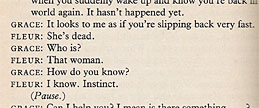
•••
The 1729 Treaty of Seville decreed that England could not conduct trade within the boundaries of Spanish colonies. Any British ship in Spanish water was, therefore, subject to search. The Spanish frequently upheld this right.
On April 9, 1731, the Spanish Guarda Costa searched the ship of merchant sea captain Robert Jenkins. During the search, the Spanish plundered Britain's trading vessel—the Rebecca—and sent her adrift; the Spanish also managed to dump supplies overboard, manhandle the crew, make harassing remarks, and slice off Jenkins' ear.
In March 1738, Jenkins testified before the British House of Commons and displayed his severed ear. Months later, Britain declared war on Spain. Skirmishes ensued.
•••
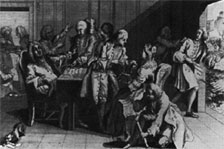
The prime minister swoons at the sight of Jenkins' ear.
•••
Historian Francis L. Berkeley Jr. observes, "The recital of [Jenkins'] story gave rise to a murmur of indignation." A footnote expounds that his story appeared in Gentleman's Magazine the year of the attack. Berkeley continues, "But all was quickly forgotten. The captain had to wait seven years for his day in court."
•••
Holes in the account remain. What measures, for instance, did Jenkins take to preserve his ear?
A high majority of reports contend that Jenkins pickled his ear in a jar. A few claim he stored it in a bottle of alcohol or kept its dry, shriveled form in a box. It would have been too small for the embalming methods of the day. Sources are inconsistent.
If Jenkins pickled his ear, he probably would have used alcohol and almost certainly would have had to heat it, possibly boil it. Guides for pickling body parts would have been extremely scarce if not nonexistent, but a thoroughgoing cookbook could have sufficed. The human ear, after all, is not unlike some foods that are commonly pickled. Oysters, say.
•••
Of course, Jenkins could have shown his lack-of-an-ear for verification of the attack. He only would have had to remove his powdered wig to expose the bare ear canal. But the physical fact of his ear pickled in a jar was hard evidence, tangible proof troops could get behind.
•••
One of the two other library search results is a legitimate historical article, and the other is a nearly five hundred page fictional account of the war. It ends with the narrator stuffing his hands in his coat-pockets, only to find Jenkins' "flat, smooth, leathery, and loathsome" ear there. Happily, the narrator gracefully recovers and closes the book with an urbane joke.
False connections abound. Further historical information hides between the yellowing pages of reviews and reference guides.
•••
As soon as Prime Minister Walpole decided to declare war, the fact that Jenkins' ear had aged—that it had been seven years—could not have hurt. The slow decay, the gradual corrosion of the ear as it wore against the preservation of pickling—all this signified the continuing torment the British suffered at the hands of the Spanish. His ear matured in symbolic value.
•••
In 1695, a London press published The Family-Dictionary; OR, Houshold Companion, "Wherein are Alphabetically laid down Exact Rules and Choice Physical RECEIPTS FOR" a number of items and processes. Among the list is "The MYSTERY of Pickling, and keeping all Sorts of Pickles throughout the Year." One entry about which the mystery of pickling is revealed: oysters.
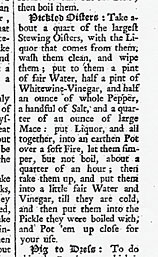 |
Such are the steps Jenkins may have taken. And so he patiently stored his ear until testifying before the House of Commons. By then the pickling liquid would have been murky with particles. |
•••
Why did it take seven years for Britain to declare war? If Jenkins' auricular misfortune justified warfare, it seems the bureaucratic process ought to have at least been expedited. They could have declared war before the hole on the side of his head scabbed over. After his testimony years later, it took Britain only a matter of months to make its official declaration of war. So why the wait?
Excuses of an inefficient government won't do. Britain simply didn't want to go to war at the time when Jenkins' ear was actually severed. Seven years' worth of mistreatment by Spaniards needed to accrue before the nation sought evidence to rally behind.
•••
The name of a war usually reveals which countries were involved, where it was fought, what the conflict was about, when it occurred, or how long it lasted. The name of the war, in short, usually describes it. Somehow researching a war by way of a name that refers to none of its events leads one to events other than the war.
•••
"Christopher becomes a model student and befriends Toby. He tells Toby of his many visions, reveals that he is the reincarnated Jesus Christ, and vows to try to save the world.."
|
Stealer's Wheel's hit "Stuck in the Middle with You" PLAYS over the speaker. NOTE: This entire sequence is timed to the music. Mr. Blonde slowly walks toward the cop. He opens a large knife. He grabs a chair, places it in front of the cop and sits in it. Mr. Blonde just stares into the cop's/our face, holding the knife, singing along with the song. Then, like a cobra, he LASHES out. A SLASH across the face. The cop/camera moves around wildly. Mr. Blonde just stares into the cop's/our face, singing along with the seventies hit. Then he reaches out and CUTS OFF the cop's/our ear. The cop/camera moves around wildly. Mr. Blonde holds the ear up to the cop/us to see. Mr. Blonde rises, kicking the chair he was sitting on out of the way. |
•••
 |
 |
•••
That a severed ear—severed seven years earlier—satisfied Britain's justification for war shows just how desperate they were for corroboration. Evidence ought to have been abundant. Jenkins' ear never should have carried so much weight. A detached ear just isn't a suitable "objective correlative."
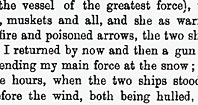 |
 |
•••
Jenkins' Ear did have some historical impact:
- George Washington's half-brother Lawrence served as a captain under Admiral Edward Vernon. Lawrence wrote home during battle and expressed his wish that the Washington estate be named after his commander. Hence "Mount Vernon."
- It was during Jenkins' Ear that the British gained their national anthem.
- Today bloggers invoke the war's name to express that something is either pointless or lacks a just cause. "This is just another War of Jenkins' Ear."
•••
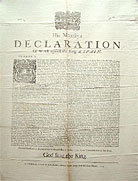
__
Could a pataphysicist justify reading "Vincent van Gogh" as a hypogram for the essay—a phrase/figure that generates or (over)determines passages but is also suppressed by the text?
